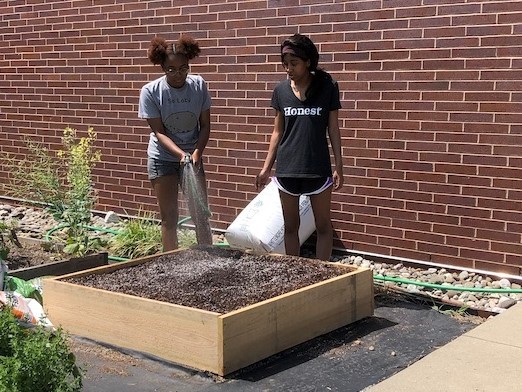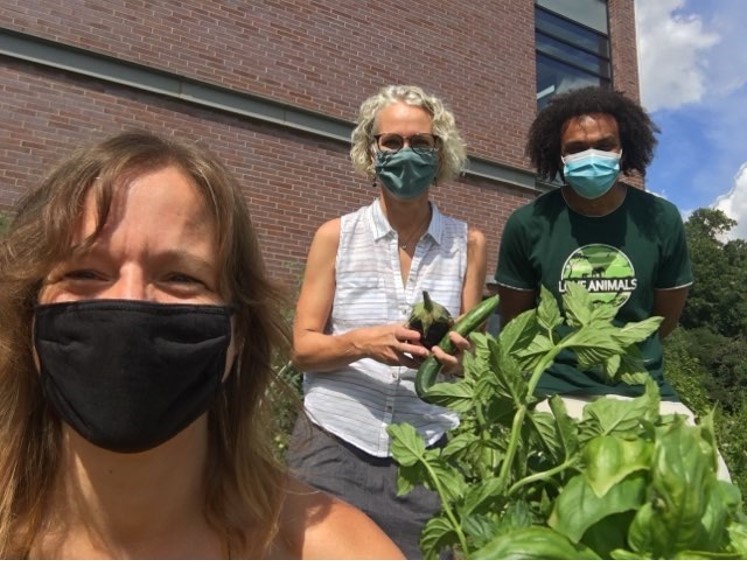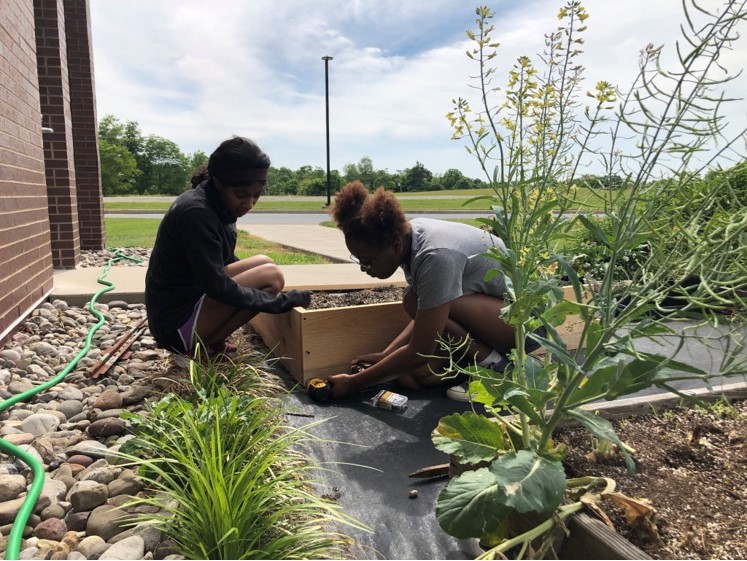
LINCOLN UNIVERSITY, Pa. – A team of Lincoln University researchers from computer science, psychology & human services, and biology have received a National Science Foundation grant to increase and broaden STEM engagement to design and implement a state-of-the-art sustainability curriculum.

Dr. Melina McConatha, Dr. Anna Hull, and Uzoma James Chikwem. | Lincoln University staff/Dr. Anna Hull.
“We are so excited to receive this funding that will allow us to expand the existing campus sustainability efforts to include student-driven curriculum development in sustainable foods,” said Dr. Anna Hull, associate professor and Biology Department chair.
The three-year, $400,000 project Lincoln University Food Intersectional Education Linked to Diversify Sustainability—referred to as LU-FIELDS—is representative of Lincoln’s commitment to high-impact learning practices that seek to create opportunities for students to apply what they are learning in the classroom while applying their knowledge to real-world problems.
“The new curriculum will be infused with a plethora of opportunities for hands-on learning as students build and maintain food gardens, research historical archives, and engage with the community around the tenants of sustainable food production and food justice using cutting edge computer science technology,” said Hull.
The project will provide research and practice targeted at inclusivity and diversity in sustainability studies.
"Our research on Black Food Sovereignty has helped build connections with Black farmers, seed keepers, and food justice advocates,” said Jada Williams, a senior psychology & human services major from Jersey City, New Jersey. “I am so thankful for the opportunity to collaborate with Black leaders and allies on this journey to create future change-makers in this a much-needed field of change.”
LU-FIELDS fosters an interdisciplinary approach to building a sustainability curriculum at the university by bringing together faculty expertise including Hull; Dr. Melina McConatha, assistant professor in the Department of Psychology and Human Services; and Uzoma James Chikwem, instructor of computer science; will lead the initiative.
The idea of LU-FIELDS comes from ongoing collaborations among the co-Principal Investigators as well as from the newly adopted Lincoln University sustainability plan in partnership with the Environmental Protection Agency, which promotes the infusion of sustainability teaching throughout the curriculum.
“Throughout human existence, food has been used as a tool to bring people together,” said McConatha. “A part of our daily lives, food is often an invisible yet common thread in connecting people, sharing ideas, and creating change. Food can be found woven throughout the history of Black music, film, art, and literature from the Chitlin’ Circuit to Soul Food. Yet, food continues to be an understudied area as it relates to Black history, community mobilization, and social sustainable change.”

The interdisciplinary and student-led approach to curriculum development will ensure an inclusive methodology that engages students across disciplines while fostering science thinking from a historically Black educational perspective.
"As a whole, it is important that society reconnects with nature. This is especially important for Black people as, I believe, the relationship that Black people have with nature has been warped as a result of slavery,” said Jaelyn Jackson, a senior computer science major from Coatesville, Pennsylvania. “Learning to garden, forage, and learning about sustainability helps people to not only connect and respect the Earth and its creatures but also the many people in the industry that may provide food for people. The LU-FIELDS project is a step forward a future that will help Black people mend their broken relationship with nature and will build respect for nature itself and the people that have been tending to nature thus far."
Outcomes of the project will include:
The project is funded through the National Science Foundation’s Historically Black Colleges and Universities Undergraduate Program Targeted Infusion Projects, which supports the development, implementation, and study of evidence-based innovative models and approaches for improving the preparation and success of HBCU undergraduate students so that they may pursue STEM graduate programs and/or careers in sustainability.
--Terrance J. Young, M.Div.